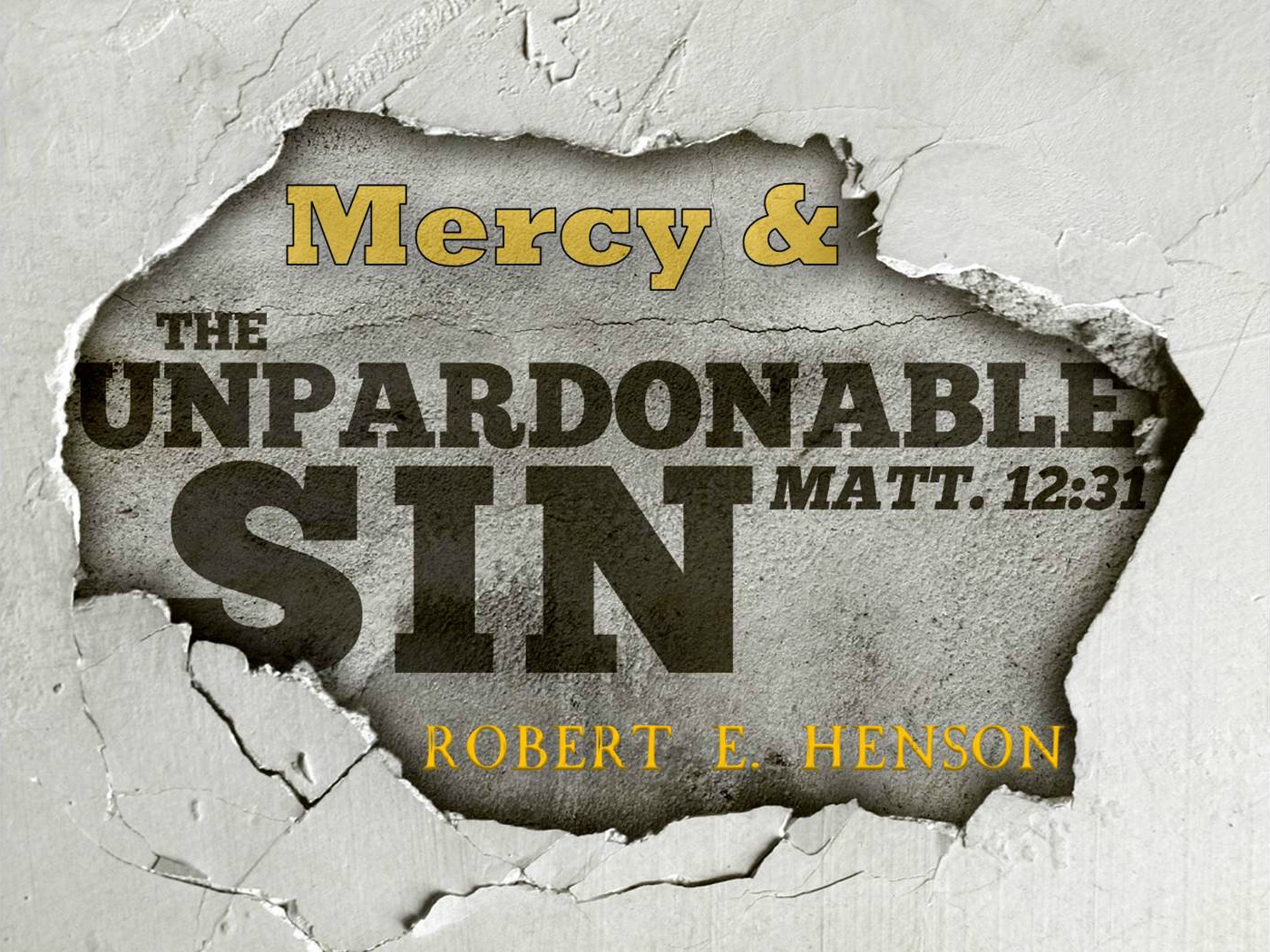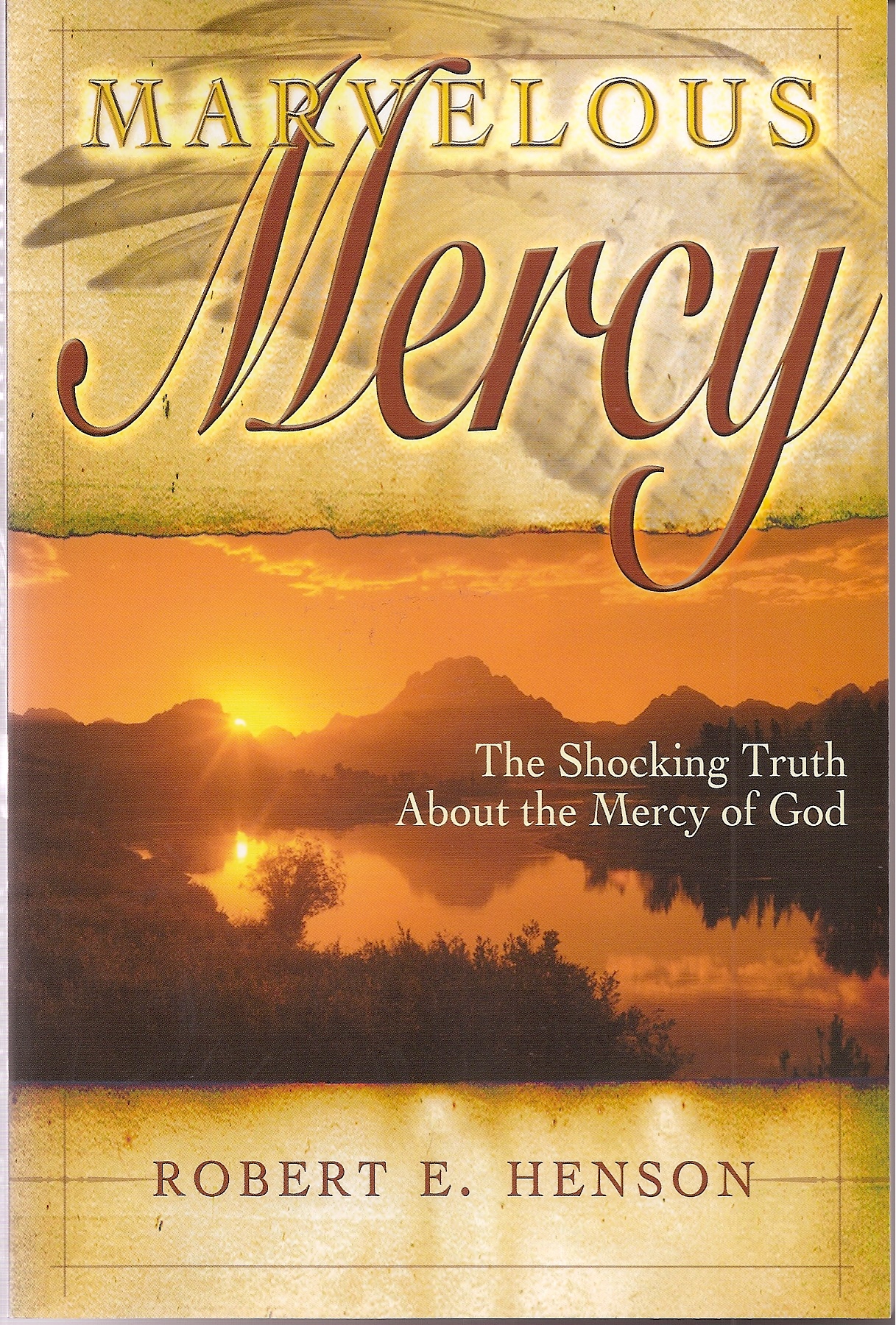
By Robert E. Henson
Mark 3:28-30 states:
“Verily I say unto you, All sins shall be forgiven unto the sons of men, and blasphemies wherewith soever they shall blaspheme:
But he that shall blaspheme against the Holy Ghost hath never forgiveness, but is in danger of eternal damnation:
Because they said, He hath an unclean spirit.”
The New Century Version says it this way:
“I tell you the truth. All sins that people do can be forgiven. And all the bad things people say against God can be forgiven.
But anyone who says bad things against the Holy Spirit will never be forgiven. He is guilty of a sin that continues forever.
Jesus said this because the teachers of the law said that Jesus had an evil spirit in him.”
In these three short verses of Scripture, there is both the threat of the most severe judgment and the offer of the most marvelous mercy. It is noteworthy that both “hair-raising” fear and reassuring hope are placed in such close proximity to one another in the textual landscape of the Bible.
It reminds me of the old picture of the great storm with its dark and foreboding clouds and the trees being harassed by strong winds. Over to the side is a large rock that looms tall. Under its overhang there is a small bird protected from the wind and the storm. It has its head thrown back, and it is singing. The painting is entitled “Peace.”
I see a similar picture in these Bible verses. It is a scene of mercy in the shadow of severe judgment.
The main focus of this chapter will be on mercy. However, I do want to take a few lines and address this scariest of all earthly subjects; that is, the unpardonable sin.
The Unpardonable Sin
Although I could do so biblically, I will not take the time to prove all of my statements with reference to this sin. I will, however, highlight some issues and make some observations in regard to the sin that has no forgiveness.
The unpardonable sin can be an ongoing event and/or a progressive action. As such, it would be a continual and persistent resistance to the Holy Ghost. The stubborn resistance is maintained until a person dies, or is cut off by God; thus, an individual continually resisting the Holy Spirit runs out of opportunities to get right with God Consequently, his or her obstinate rebellion is unpardonable.
Such persons resist the Holy Ghost. They continue their resistance until they grieve the Holy Ghost. Finally, they are eternally cut off from the Spirit of God. This is certainly one form of the unpardonable sin.
However, I don’t believe that such definitions fully encompass the terrible and horrifying sin about which Jesus warned us. Also, is it possible that more than one type of action is, or can be, included in the unpardonable sin? Let’s look at what the Bible has to say on this subject.
Matthew gives us an account of this teaching in chapter 12, verses 31-37, of his writings. The Pharisees accused Jesus of casting out devils through Beelzebub, the prince of devils. Jesus had declared in this same chapter that He cast out devils “by the Spirit of God,” which is the Holy Ghost.
The Holy Ghost is God in action! In verse 31, Jesus calls the sin in question, “blasphemy against the Holy Ghost,” or speaking against God in action. In verse 32, He classifies the guilty parties and the sin in this expression, “whosoever speaketh against the Holy Ghost.” The language clearly delineates that this sin involves speaking or talking; namely, against the Holy Ghost (I will elaborate on this more shortly).
In verse 32, Jesus declares the severity of the Judgment on this sin,
“it shall not be forgiven him, neither in this world, neither in the world to come.”
If anything puts the fear of God in our hearts, this should.
Jesus made an additional and significant declaration in Luke 12:8-12.
Also I say unto you, Whosoever shall confess me before men, him shall the Son of man also confess before the angels of God:
But he that denieth me before men shall be denied before the angels of God.
And whosoever shall speak a word against the Son of man, it shall be forgiven him: but unto him that blasphemeth against the Holy Ghost it shall not be forgiven.
And when they bring you unto the synagogues, and unto magistrates, and powers, take ye no thought how or what thing ye shall answer, or what ye shall say:
For the Holy Ghost shall teach you in the same hour what ye ought to say.
Here Jesus teaches on blasphemy of the Holy Ghost and links it with denial. Particularly, it is a denial “before men,” or in front of others.
The connotation is a denial under pressure, for in the adjoining verse he speaks of the courts and the authorities and religious councils. According to the Lukan reference, such talk about the “Son of man” (reference to the flesh of God) is forgivable. Such talk against the Holy Ghost (God in action) is unforgivable.
It is questionable whether a person could deny the Holy Ghost in this fashion unless previously they had received the Holy Ghost. However, to have had the Holy Ghost and then to deny its reality is a most fearful thing indeed.
Mark gives us even more understanding on this awful sin in the third chapter of his book. There, Mark clearly notes (verse 30) why Jesus in verse 29 had given a warning of eternal damnation for blasphemers of the Holy Ghost—”Because they said, He bath an unclean spirit.”
Who is the “they” referred to here? According to verse 22 it was the “scribes” or the religious teachers and recognized authorities of biblical interpretation. This is a significant fact.
They “came down from Jerusalem.” Why would they make such an accusation? Verse 20 gives the reason for their coming and their concern, which led to their blasphemy; it was “the multitude.”
Jesus was drawing humungous crowds. The scribes, speaking out against the miracles performed by Jesus and accusing Him of doing them by the power of the devil, were making a deliberate attempt to cause other people to turn away from the Spirit of God.
This, I believe, is the critical issue involved in the blasphemy of the Holy Ghost. It is a deliberate effort to cause other people to turn away from the Spirit of God. While I do believe we should be careful about any verbal reference to the Holy Ghost, I don’t think the severe judgment attached to this warning is inclusive of people who have just voiced some personal doubt about the workings of God. Many persons have done that at some time in their life. Later they woke up to rev-elation, sought forgiveness for their folly, and it was granted. They are in church today and serving well. Some of them are now preachers.
The Apostle Paul was such a person. He spoke of himself in 1 Timothy 1:13, saying,
“Who was before a blasphemer, and a persecutor, and injurious: but I obtained mercy, because I did it ignorantly in unbelief .”
The key to his receiving forgiveness was that he was “ignorant” and in a state of “unbelief.” This is radically different from a deliberate and knowledgeable attempt to turn people away from the Spirit of God.
This willful blasphemy is what Jesus had in mind when He spoke in Luke 17:1-2:
“Then said he unto the disciples, It is impossible but that offences will come: but woe unto him, through whom they come!
It were better for him that a millstone were hanged about his neck, and he cast into the sea, than that he should offend one of these little ones.”
Unquestionably, the sin of blasphemy against the Holy Ghost is the most terrible thing a person can do. Let us be warned and never encroach upon it.
Marvelous Mercy
Note the reference to mercy—marvelous mercy—given right alongside of the warning concerning blasphemy in Mark 3:28-30 (NCV):
- “All sins that people do can be forgiven.”
- “And all the bad things people say . . . can be forgiven.”
Take a moment and catalogue with me a list of some of the bad things people can do.
- Murder
- Lust
- Fornication
- Adultery
- Homosexuality
- Bestiality
- Incest
- Rape
- Chemical addictions
- Robbery and thievery
- Cheating and fraud
- Betraying family and friends
- Anger and violence
- Idolatry
- Witchcraft
- Hatred
- Violence
- What else?
Now let us identify some of the evil things that people can say.
- Cursing
- Lying
- Slander
- Disrespect
- False doctrine
- What else?
The fact is this—if individuals repent, they can he forgiven of these sins! Hallelujah!
The Bible declares this to be true. 1 John 5:7 says,
“But if we walk in the light, as he is in the light, we have fellowship one with another, and the blood of Jesus Christ his Son cleanseth us from all sins.”
Mercy and the Unpardonable Sin
Robert Lowry, a songwriter of some decades ago, worded it like this:
What can wash away my sins?
Nothing but the blood of Jesus.
What can make me whole again?
Nothing but the blood of Jesus.
0! Precious is the flow
That makes me white as snow, No other fount I know,
Nothing but the blood of Jesus.
The blood of Jesus Christ washes away all of our sin. That is marvelous mercy indeed!
Now let us consider another classic scriptural illustration of mercy in the shadow of severe judgment.
Magnified Mercy
Sodom and Gomorrah were morally polluted cities. They were cities in which sexual perversion was rampant. Lot chose to live in the environment of this filthy metro area.
Lot was not in the place where he should have been. In great mercy, God sent a warning to Lot that judgment was soon to fall on these spiritually decadent municipalities. He even sent two heavenly envoys to assist Lot in getting out of the city and the immediate region.
Genesis 19: 15-20 illustrates this:
“And when the morning arose, then the angels hastened Lot, saying, Arise, take thy wife, and thy two daughters, which are here; lest thou be consumed in the iniquity of the city.
And while he lingered, the men laid hold upon his hand, and upon the hand of his wife, and upon the hand of his two daughters; the LORD being merciful unto him: and they brought him forth, and set him without the city. [Emphasis added]
And it came to pass, when they had brought them forth abroad, that he said, Escape for thy life; look not behind thee, neither stay thou in all the plain; escape to the mountain, lest thou be consumed.
And Lot said unto them, Oh, not so, my Lord:
Behold now, thy servant hath found grace in thy sight, and thou host magnified thy mercy, which thou hast skewed unto me in saving my life; and I cannot escape to the mountain, lest some evil take me, and I die: [Emphasis added]
Behold now, this city is near to flee unto, and it is a little one: Oh, let me escape thither, (is it not a little one?) and my soul shall live.”
The language of the Bible is interesting; it says, “and while he [Lot] lingered.” Lot knew he was not where he should be, but he still hesitated to fulfill the command of God.
The Bible declares that the angelic beings literally took Lot, his wife, and his daughters by the hand and authoritatively led them out of the city. The result was that Lot’s life was spared and his soul lived. When I read this story, I am amazed at how patient and how merciful God was with Lot.
“The Lord being merciful unto him.” This is the Bible’s summation of the entire episode. Merciful literally means full of mercy. It was He who was and is full of mercy that spared Lot’s life.
Lot’s Testimony
Lot himself gave a testimony about these events. It was a three-fold tribute to the Almighty. Lot said:
Mercy and the Unpardonable Sin
- Thy servant has found grace in Your sight;
- You have magnified Your mercy; and,
- You have saved my life.
Lot gave witness that, in God’s granting grace to him and pre-serving his life, the Lord had magnified—or made more visible—His mercy to Lot. What a great observation.
God’s mercy, in actuality, cannot be enlarged. However, there are providences that God bestows upon us from time to time that make His mercy loom larger and more visible to our view. These are truly awesome experiences that should fill our hearts with deep gratitude. Such incidents help us to better understand just how merciful the Lord truly is.
A Personal Experience with Mercy
Some years ago I was urgently called to the hospital at the request of a dying man. I had known this man for more than 20 years and considered him a friend. This man had at one time known the Lord, but for the last several years of his life he had not walked with God. He was not a terrible person, but he himself acknowledged that he was not right with God. He sensed the end of his life was near.
When I stepped into the hospital room, my father and mother were already there. My father, a long-time pastor, was talking with the man. They had been conversing about death, and the man had expressed that he was not spiritually prepared to die; consequently, he was afraid of dying.
My father reminded the man that years ago he had obeyed the gospel. My father went on to tell our mutual friend that if he would repent to God and mean it sincerely from his heart, God would have mercy upon him, forgive him, and restore him.
I entered the conversation at that point. I called him by name and inquired, “Is there anything at all that troubles you? Is there any-thing specifically that’s not right between you and God?” He said, “Yes.” He then expressed the nature of the problem. As he proceeded, he was overcome by emotion and immediately began to call out to God with great earnestness for mercy and help.
As he prayed, I reminded him that God is indeed merciful. I encouraged him to allow God to renew him in the Holy Ghost. Something holy welled up from deep inside his spirit. Those in the room could sense that victory was near. Almost instantaneously, as my father and mother, his wife, and I prayed with him, he broke out speaking in a heavenly language. It was not a shallow experience. Over the next while, even after the rest of us had ceased praying, he would occasionally break forth again into that heavenly prayer language as he continued communicating with God.
I was reminded as I left the hospital that day of just how merciful the Lord is. That incident magnified God’s mercy in my thinking. It has forever enlarged my view and understanding of the mercy of God. God will reach a long way to rescue somebody who will sincerely cry out to Him.
I am not suggesting that folks wait until their last few hours to call upon the Lord. As a matter of fact, don’t take that horrible chance. Many people don’t have lingering moments at the end of their lives during which to pray. Many are cut down even before they know what hit them. Many die with no warning and no space or time to repent.
What I am suggesting is this—God is more merciful than you or I can possibly fathom. Such is His magnified mercy.
Mercy—marvelous mercy—in the shadow of severe judgment.
The above article, “Mercy and the Unpardonable Sin,” is written by Robert E. Henson. The article is the 6th chapter of Henson’s book, Marvelous Mercy. The book was published in 2004.
The material is most likely copyrighted and should not be reprinted under any other name or author. However, this material may be freely used for personal study and research purposes.




1 thought on “Mercy and the Unpardonable Sin (Entire Article)”
Comments are closed.